

Circle of Concern, Circle of Influence, Circle of Control. Sharebar In Stephen Covey’s 7 Habits of Highly Effective People, there’s a diagram very similar to the above.
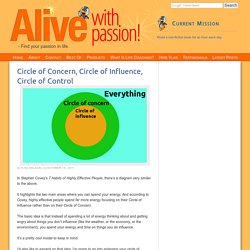
It highlights the two main areas where you can spend your energy. And according to Covey, highly effective people spend far more energy focusing on their Circle of Influence rather than on their Circle of Concern. The basic idea is that instead of spending a lot of energy thinking about and getting angry about things you don’t influence (like the weather, or the economy, or the environment), you spend your energy and time on things you do influence.
It’s a pretty cool model to keep in mind. I’d also like to expand on that idea. But first, let me explain the idea of the two above circles a bit more. Circle of Concern, Circle of Influence. 5 Reasons Why You Should Take a Nap Every Day. I am a habitual nap-taker.
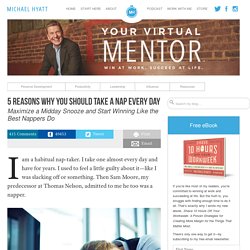
I take one almost every day and have for years. I used to feel a little guilty about it—like I was slacking off or something. Then Sam Moore, my predecessor at Thomas Nelson, admitted to me he too was a napper. “Every day after lunch, I lie down on the sofa in my office,” he recounted. “I hold my car keys in my right hand and let my hand hang toward the floor. Napping Celebrities I then discovered many other successful people who were nappers: Leonardo da Vinci took multiple naps a day and slept less at night. Could these successful leaders know something you don’t? Are you ready to stop drifting and design a life you love? Napping Benefits I suggest you seriously consider taking a daily nap for the following five reasons: A3 & Kaizen: Here's How. How much sleep do we really need to work productively? 9.5K Flares Filament.io 9.5K Flares × Every one of us, on average, will be sleeping 24 years in our lifetime.
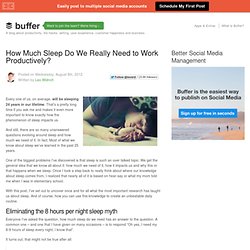
That’s a pretty long time if you ask me and makes it even more important to know exactly how the phenomenon of sleep impacts us. And still, there are so many unanswered questions evolving around sleep and how much we need of it. In fact, Most of what we know about sleep we’ve learned in the past 25 years. One of the biggest problems I’ve discovered is that sleep is such an over talked topic. With this post, I’ve set out to uncover once and for all what the most important research has taught us about sleep. Eliminating the 8 hours per night sleep myth Everyone I’ve asked the question, how much sleep do we need has an answer to the question. It turns out, that might not be true after all: “We’ve all been told you ought to sleep 8 hr., but there was never any evidence.” Says one of the most acclaimed researchers about sleep Daniel Kripke in an interview.
The problem lies elsewhere. 1.) 10 Simple, Science-Backed Ways To Be Happier Today. Editor's Note: This is one of the most-read leadership articles of 2013.

Click here to see the full list. Happiness is so interesting, because we all have different ideas about what it is and how to get it. It’s also no surprise that it’s the Nr.1 value for Buffer’s culture, if you see our slidedeck about it. So naturally we are obsessed with it. I would love to be happier, as I’m sure most people would, so I thought it would be interesting to find some ways to become a happier person that are actually backed up by science. 1.Exercise more--7 minutes might be enough You might have seen some talk recently about the scientific 7 minute workout mentioned in The New York Times. Exercise has such a profound effect on our happiness and well-being that it’s actually been proven to be an effective strategy for overcoming depression.
The groups were then tested six months later to assess their relapse rate. Visualize. learn. improve. 10 Ways to Use Evernote More Effectively - J.D. Meier's Blog. This post will give you some Evernote tips and tricks for how to use Evernote as a Personal Information Manager or as a personal knowledge base.
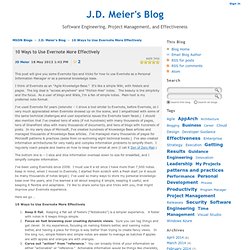
I think of Evernote as an "Agile Knowledge-Base. " It's like a simple Wiki, with folders and pages. The big deal is "access anywhere" and "friction-free" notes. The beauty is the simplicity and the focus. As a user of blogs and Wikis, I'm a fan of simple notes. I've used Evernote for years (sidenote -- I drove a tool similar to Evernote, before Evernote, so I very much appreciated when Evernote showed up on the scene, and I empathized with some of the same technical challenges and user experience issues the Evernote team faced.)
The bottom line is -- I slice and dice information overload down to size for breakfast, and I simplify complex information. Merezano : If you don't like to-do lists,... Mind / Concept Maps. The Theory Underlying Concept Maps and How to Construct and Use Them.
Concept maps are graphical tools for organizing and representing knowledge.
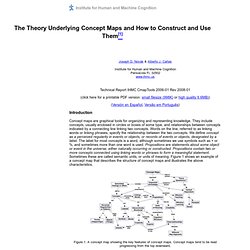
They include concepts, usually enclosed in circles or boxes of some type, and relationships between concepts indicated by a connecting line linking two concepts. Words on the line, referred to as linking words or linking phrases, specify the relationship between the two concepts. We define concept as a perceived regularity in events or objects, or records of events or objects, designated by a label. The label for most concepts is a word, although sometimes we use symbols such as + or %, and sometimes more than one word is used. Propositions are statements about some object or event in the universe, either naturally occurring or constructed. Productivity Articles at Stepcase Lifehack.